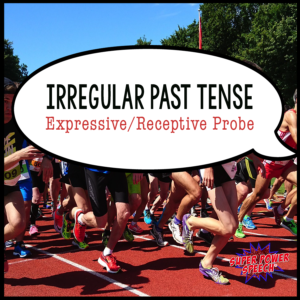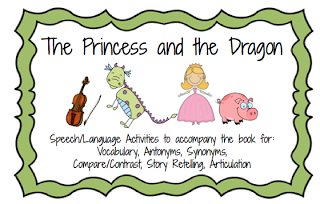Irregular Verbs- Where do they come from and how can we help?

How many of your students are working on irregular past tense verbs? If your caseload looks like mine, it is probably a quarter of your students that struggle in this area. And it is no surprise. Irregular verbs are…. well irregular!
According to liguasorb.com, the top five irregular verbs in English are: to be, have, do, say, go. In fact, Erez Lieberman, a graduate student at Harvard University stated in this article that, “The top 10 verbs in the English language are all irregular, even though irregular verbs make up only 3 percent of the language.”
Last May, I listened to a truly fascinating podcast. The theme of the episode was the origin and future of irregular past tense verbs. There was so much to learn that I listened to the episode three times to try to absorb it all. You can listen to the entire episode here.
In the podcast, Michael Rosen and Dr. Laura Wright discuss that in the Indo-European language, past tense verbs were formed with a vowel change (such as modern “swim -> swam”). Most of our present day irregulars continue that pattern of vowel change. There are some common irregulars, however, that are made up of multiple verbs. For example, the past tense of “go” came from the archaic verb “wend”. And the verbs within “to be” are made up of multiple original verbs: “am, is, be, was”.
In more recent history, the ancient Germanic language began to create new verbs from nouns and adjectives (for example the adjective “full” became the verb “to fill”). The Germanic languages added a rule that these new verbs would become past tense by adding a “did” after the verb. So “fill” become “fill did”, which transformed over time to “filled”.
In a segment on the episode, they replayed an interview with Steven Pinker in which he explains the linguistic evolutionary process of changes to past tense. Some regular verbs become irregular to follow the pattern of another irregular verb. For example “dive” became “dove” because of the similar irregular verb “drove”. The most recent verb to transform into irregular was “snuck”, which was most likely following the pattern of “stuck”. He states that English speakers above 65 years old will still use “sneaked” and perceive “snuck” as odd sounding.
Most verbs, Pinker stated, are moving in the direction of becoming regular. For example, new verbs introduced into English are given “ed” endings as in “texted, Facebooked, IMed”. As a default, when an individual cannot remember if there is a verb change, they will automatically add an “ed” ending. A 2007 study from Harvard University predicts that some less common irregular verbs will evolve to become regular. The next verb that they expect to become regular is “wed -> wedded”.
This is exactly why our students struggle so much with the less common irregular verbs. Memorizing uncommon irregulars is difficult both for native and non-native speakers. Children with a language disability are most likely to only know the most common irregulars. That is also why children with a language disorder typically do not error on common irregulars (had, said, went) because they have heard them so many times that they are memorized.
As speech-language pathologists, we spend a good deal of time helping students learn verb tenses, especially irregular verbs. It would be wonderful if all verbs followed one pattern for tense changes. However, due to the complex history of language and linguistic evolution, English (as well as other Germanic languages) has multiple ways of forming its past tense verbs. It is up to teachers, parents, and SLPs to consistently expose children to the exceptions until they are memorized. It is also important for children to work on irregular verbs. When exposed repeatedly, they will begin to form the neural pathways to memorize these verbs.
To help with this process, I have created a probe that are between the 25-50th most common irregulars. These verbs are most likely developing, but not memorized, for children with a syntax disorder. The probe can be used as a baseline as well as for ongoing progress notes. Sign up for my newsletter HERE to get your free copy of the irregular verbs probe. This will be of great assistance as you monitor children’s development of these important words.

Good luck in your verbing endeavors!







Thank you for the podcast. Have you listened to The History of English podcast? I highly recommend it. I found episode 5 fascinating – the focus was on the letter C and its 2 sounds.
Thanks for the recommendation!!